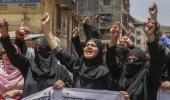Crucial reforms in Muslim personal law, especially laws related to inheritance and adoption, need to be initiated forthwith; historically speaking, without the State's backing, hardly has any reform taken place or allowed to prevail, asserts Mohammad Sajjad.

The Supreme Court on July 10, 2024, ruled that a divorced Muslim woman is entitled to a claim of maintenance under Section 125 of the Code of Criminal Procedure (CrPC), 1973, against her former husband -- affirming that a parallel remedy under a secular law cannot be foreclosed by existing personal laws.
The Supreme Court also reiterated that the 1986 Act (nullifying the Shah Bano verdict) won't be relevant in such cases.
This is something which was clarified by the Supreme Court in the Danial Latifi vs Union of India (2001).
The Supreme Court had pronounced similar verdicts in 1979 (Tahira Bi vs Ali Hasan), 1980 (Fazlun Bi vs Qadir Wali) and in 1985 (Shah Bano) as well.
The All India Muslim Personal Law Board (AIMPLB), having lost its credentials and in a changed political atmosphere, cannot instigate the community for street agitations any longer unlike what they did in 1985-1986 and also in 1972-1973.
The AIMPLB, however, refuses to welcome the verdict and go for internal reforms on some of the issues which will be identified in this column.
The AIMPLB is trying to obfuscate and mislead its constituency by confusing them and instigate them by creating confusion.
They are trying to mobilise other religious minorities (external link) and to make them rise against the Uniform Civil Code (UCC).
Contrary to the AIMPLB's political intent, it needs to be clarified that the issue of reforming Muslim family laws and moving towards implementing the UCC are distinctly different and segregated issues.

The incumbent BJP government, before going in for parliamentary elections 2024, had proposed to go ahead with legislating and implementing the UCC.
The 22nd Law Commission of India (LCI) had been constituted, and it had solicited proposals from citizens, to be emailed to the member secretary of the LCI.
Certain political-ideological forces have always been insisting upon the UCC. Many segments of Muslims have been reacting to it in a manner as if the UCC is simply and exclusively an attack on their personal laws.
As a result, responding to the 22nd LCI, many Muslim leaders and theologians looked upon it as referendum or plebiscite on the UCC.
These theologians and leaders appealed to the community to reject the UCC. Thus, both sides (the political proponents of the UCC, as well as the opponents belonging to various ideological persuasions) pushed ahead the politics of polarisation.
The Muslim side had claimed that they had submitted several lakhs of emails to the LCI rejecting UCC.
Announcements were made from masjids in Friday prayers to do so, besides using social media.
Many masjid speeches also said that in the absence of any draft proposal from the government there is really no need to panic.
Also, the noteworthy fact is, in 2018, against the reform in the instant triple talaq (ITT), they could gather around two crores of signatures against the proposed reform.
This time it was confined only to several lakhs (the figures are unverified). This may indicate falling support for the theologians among the Muslim populace.
Collective hypocrisy of both sides becomes apparent. It is a relatively lesser known fact that in the 1950s, the UCC was brought to the fore by the Hindu Right across political parties, just to forestall the Nehruvian reforms in Hindu Personal Law. They didn't have the conviction for UCC.
Just like the Muslim regressive forces, who oppose the UCC not because they hate homogeneity and love heterogeneity within the religious communities, rather, they oppose the UCC just to forestall any reform in the Muslim Personal Law. Muslims think only Muslim rulers can interfere in Islam. Non-Muslim rulers cannot.
Nehru had excluded Muslims while legislating on reforms in Hindu laws with an argument that the reforms among religious minorities would come from within themselves.
That moment is yet to come, even after over seven decades. This is what became known as one of the foremost components of Muslim appeasement by the Indian State.

In April 1973, the All India Muslim Personal Law Board (AIMPLB) was established.
The immediate reason was to oppose the law of child adoption amended in 1972, says Saumya Saxena's research essay (2018)(external link).
This amended law didn't directly affect the Muslims. Yet, they went ahead with fierce street opposition.
This was to demonstrate Muslim strength in identity politics and to warn the government of the day.
Let it be made clear that there is a sharp distinction between adoption and custody.
In the secular law (Guardians and Wards Act 1890), the custody of the baby disputed between the biological and foster parents is determined keeping in mind the welfare of the baby and also the wish of the baby.
This is quite consistent with what Prophet Muhammad had done in the case of his adopted son, Zayd.(external link)
The custody of Zayd continued with the Prophet as per the wishes of Zayd, despite his biological father, Harisa, having come to claim him back.
So far as adoption is concerned, the Quran instructs not to conceal the biological parentage of the adopted baby.
This is often popularised as summary prohibition against adoption. The AIMPLB refuses to issue this clarification.
As a result, even the higher judiciary almost invariably adjudicates against Muslim foster parents, invoking this misinterpretation.
There is no law to punish the biological parents, as to, if they, as afterthought, invoke the Islamic prohibition against adoption, then why did they give away their baby in adoption to begin with.
Thus, in the case of Hindus, any signed document is accepted by the judiciary as proof of adoption, whereas in the case of Muslims and Christians, adoption is invalidated despite such documents.
Needless to say, upsetting the custody of the child in this manner leads to psychological and overall ruination of the child's life and career.
Fortunately, since January 2016, the Juvenile Justice Act has come into force which is of some help to Muslims as well.
The pre-2016 adoptions, now coming to the judiciary, are often adjudicated upon as per the misinterpreted Muslim law.
Recently, the supreme court of Pakistan even went on to validate concealing the biological paternity of the child.
As if the Indian judiciary is more Shariat-abiding than the Islamic countries, not just Pakistan! Though the Supreme Court, in its landmark verdict of March 4, 2024 (Shazia Aman Khan vs The State of Orissa) awarded custody(external link) of a 14-year-old girl to the adoptive Muslim parents.
On the question of Un-Quranic Instant Triple Talaq(external link) (ITT; divorce), the AIMPLB refuses to make the necessary reforms.
Most of the Islamic countries have reformed it. Even on the Shah Bano issue, in early 1986, the AIMPLB leader Ali Miyan Nadvi (1914-1999) misleadingly persuaded the then prime minister Rajiv Gandhi to ignore the reforms carried out in Islamic countries. This is confessed by Nadvi in his Urdu memoir (Karwan-e-Zindagi, 1988).
This fact is known to very few people that Mohammad Ahmad Khan (1913-2006), a rich and influential advocate of Indore, had married (in 1946) a cousin of his wife Shah Bano (1916-1992), and that in 1975 he threw Shah Bano out of the house, when she was 60 years old.
Shah Bano went to the lower court in April 1978 for maintenance. The lower court issued an interim order for maintenance.
Just to get rid of the maintenance, on November 6, 1978, Khan pronounced instant triple talaq inside the trial court of Indore.
Subsequently, the issue reached the high court and eventually the Supreme Court.
It was the maintenance awarded by the Supreme Court, in April 1985, which was upturned by Parliament in May 1986.
In its exchange, the AIMPLB delegation to the PM had agreed to go ahead with unlocking the Ayodhya Masjid.
Nicholas Nugent's biography of Rajiv Gandhi and Ali Miyan's Urdu autobiography together corroborate this.

Now coming to the Muslim law related to inheritance of parent's assets.
In the 1930s, when the Shariat law was being codified, a daughter of the landed, powerful family of Sikandar Hayat Khan Tiwana, the premier of the undivided Punjab, asked for her right in landed properties as per the Sharia law.
Tiwana, in order to find ways of denying this demand to the woman, approached Mohammad Ali Jinnah to shelve the Shariat codification.
Jinnah came out with outrageously manipulative and dishonest arguments: Firstly, the local customs are laws, and hence, the custom of not letting daughters inherit landed property would continue, despite the Shariat law; Secondly, agriculture and land are provincial subjects whereas the Shariat Act would be a subject of the central legislature.
In 1937, Jinnah piloted the Shariat Act, seeing in it an opportunity to forge an all India Muslim political constituency to pursue his separatist politics.
We are yet to know, if Maulana Azad, Maulana Husain Madani of the Muttahidah Qaumiyat fame, and even Maulana Maududi really said anything on the Shariat Act 1937.
In 1962, Jinnah's Pakistan introduced some reforms in the family laws, such as: ITT was prohibited; justifiable and proportionate to the economic status of the husband, the amount of alimony had to be paid to the divorced woman; polygamy was restricted to the extent of near-prohibition.
Without a written consent of the existing wife, another wife cannot be brought into the marriage; the minimum marriageable age was also raised, etc.
Yet, in 1986, in India, the Ulema and other leaders went on to ruin the likes of Shah Bano. They still continue to do so quite shamelessly.
Criminalisation of ITT in 2019, is acting as a very good deterrence. But, the issue of maintenance to the separated wife and adequate or proportionate alimony/maintenance to the divorced women remained unresolved.
Let it be known that, in early 1986, while negotiating with the prime minister, the delegation led by Ali Miyan Nadvi had promised that they will make some institutional arrangement to extend financial help to the divorced women who have been denied maintenance and alimony.
This promise is recorded very clearly in the Nadvi's Urdu memoir (1988), Karwan-e-Zindagi, volume three, chapter four.
This promise has been chosen to be forgotten by the Ulema, intelligentsia and the community. Already, Muslim men have found a way around the restriction on ITT -- torture the wife to give khula.

In February 2018, the spokesperson of the AIMPLB issued a statement that they will issue a model nikahnama (external link) inserting a column for a pledge by the bridegroom not to go for ITT (Times of India, Lucknow, February 3, 2018).
Within a week time, in the 26th plenary session of the AIMPLB (in Hyderabad, 9-11 February, 2018), the board conveniently chose to shelve the idea.
The State and intelligentsia need to expose the abovementioned duplicities of the segments of Muslim leadership.
It is distressing that even the modern institutions funded by the secular State of India, such as the AMU, Jamia Millia Islamia (New Delhi), MANU University (Hyderabad), and their departments of studies such as gender and women studies, Islamic studies, theology, law, social sciences, etc, have not been able to pursue a reformist agenda with any degree of sincerity and conviction.
Quite a lot of them have either maintained a dishonest silence or have endorsed the regressive positions (external link).
Both ways, they are on the regressive side. This is extremely disgusting, to say the least.
This time however, Hasan Suroor's column (external link) has taken on the AIMPLB's regressivism and hypocrisy.
There has to be a compulsory registration of marriages, divorces, besides the registration of birth and death.
While the paternal grandfather is alive, if someone loses his/her father, then s/he forfeits his/her right to inherit the grandfather's assets. This law also needs to be done away with by the Indian legislature.
Muslim parents (external link) with only daughters (no sons), if they don't transfer their assets while they are alive, then the daughter will inherit only a part of their father's assets.
Even a will registered in the court of law to the contrary will not do, as per the as per the existing interpretations of Muslim law in India.
Owing to this discriminatory law, some Muslims have begun to re-register their marriages under the Special Marriages Act. (external link)
Also, some Muslim daughters have begun to challenge this discrimination in the Supreme Court. (external link)
Muslim parents, having no kids, cannot even register a will in the court of law bequeathing all their assets. As per Muslim law, they can bequeath only a third of their own assets to anyone.
The Supreme Court, despite Hindu Law having a contrarian provision, has given its verdict for equal right to inherit parental assets by daughters and sons. (external link) This gender justice must be made to prevail in the case of Muslims as well.
By way of conclusion, historically speaking, without the State's backing, hardly ever is any reform allowed to prevail.
In the colonial period as well, reforms like abolition of Sati (1829), abolition of slavery (1847), widow remarriage (1856), law against child marriage (1891), [and even codification of Shariat (1937), howsoever, quite patriarchic and regressive], etc, happened only with the State's backing.
People need to persuade the current dispensation that it needs to go beyond electoral gimmicks, and implement the above mentioned seven aspects of family law reforms (including gender-just laws).
Meanwhile, a draft UCC should be prepared for wider debate. (Sadly, at the moment, they, too, are shelving family law reforms in the name of opposing the UCC). The personal law reforms cannot wait.
The UCC can and should wait. This is something even the Liberal-Left should also try to understand.
That is the way forward, and one of the ways to avoid or minimise competitive communal polarisation.
Mohammad Sajjad teaches Modern and Contemporary History at Aligarh Muslim University and is the author of Muslim Politics in Bihar: Changing Contours (Routledge 2014/2018 reprint).
Feature Presentation: Rajesh Alva/Rediff.com










